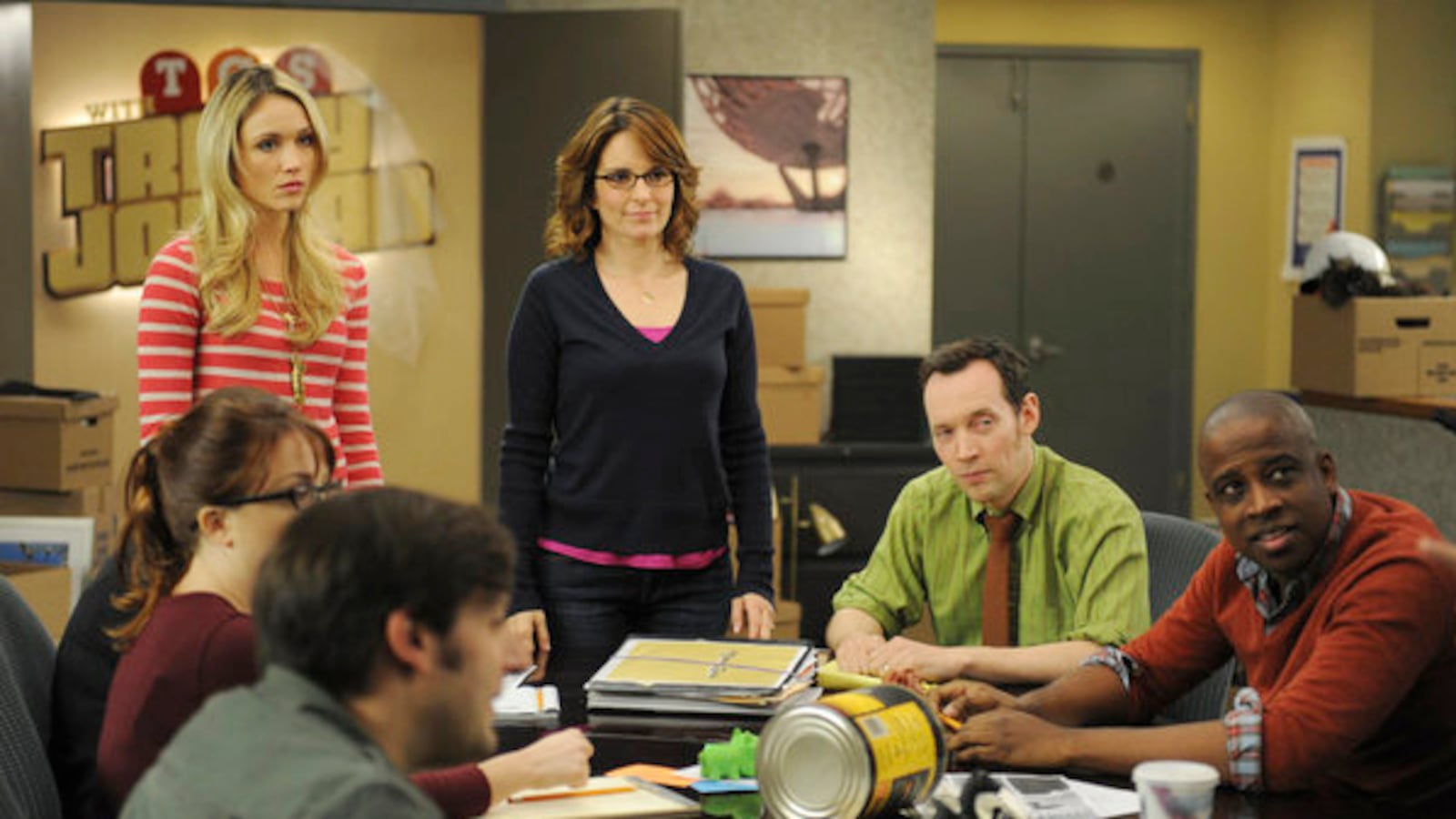When it comes to nerdery, even The Big Bang Theory has nothing on 30 Rock. After all, what other show has been known to mix feminist commentary, Battlestar Galactica allusions, and backhanded current-event references (“Did you know it’s still illegal to be black in Arizona?”) all in the same episode?

Turns out 30 Rock’s deeper scholastic meaning hasn’t gone unnoticed by academia, either. As the series finale approaches tonight, experts in the burgeoning field of 30-Rockism weigh in on what the show has taught us over the past seven years.
Lesson No. 1: 30 Rock Satirizes Neoliberalism
“Affirmative action was designed to keep women and minorities in competition with each other to distract us while white dudes inject AIDS into our chicken nuggets.”– Tracy Jordan
First of all, what the frak is neoliberalism?
“It’s this assumption that we’re all on an equal playing field, and that social structures don’t play a role in how our lives play out,” says Eleanor Patterson, who wrote her master’s thesis at the University of Maine on 30 Rock and its contribution to neoliberal discourse. For example, she says, “Postfeminism is a very neoliberalist idea—it’s the idea that we’ve already gotten rid of the structures that keep women down.”
Example: Liz doesn’t care about getting married, but ends up having to do so as a way to remove obstacles in the adoption process. “The fact 30 Rock doesn’t make her marriage the keynote of the whole series is interesting, but she also doesn’t get kids until she fulfills that norm,” Patterson says.
Or take the character of Tracy Jordan, whose repressed memories of growing up in the projects come back to haunt him in this gem of a monologue from Season 4:
"I've seen a hooker eat a tire," Jordan's character says. "A pack of wild dogs took over and successfully ran a Wendy's. The sewer people stole my skateboard. The projects I lived in was named after Zachary Taylor, generally considered to be one of the worst presidents of all time. I once saw a baby give another baby a tattoo. They were very drunk."
Neoliberalist critique, get it?
Lesson No. 2: 30 Rock Is a Commentary on Modern Feminism
Jack: Lemon, I'm impressed. You're beginning to think like a businessman.Liz: A businesswoman.Jack: I don't think that's a word.
“Tina Fey has the reputation for being the poster girl for feminism,” says Linda Mizejewski, a professor at Ohio State University who has written about the show’s discourse on gender. “But the show has never been a feminist show—it’s a show about feminism and the different contradictions of feminism. And one thing it’s been lampooning since the beginning is the idea of the superwoman who can ‘do it all.’”
Example 1: In last week’s penultimate episode, Liz is must literally choose between her job and her newly adopted children. She chooses her job, but then everyone on the cast and crew forces her to make a different choice by quitting.
“They’re making fun of the way that problem is solved easily in a sitcom. Everyone just quits,” Mizejewski says. “The point of that is that in real life, women have these impossible expectations—we’re supposed to be ideal mother and wife, but also have amazing careers. It’s not romanticizing that ideal woman, but admitting those conflicts are there, and recognizing that the desire for both is there as well.”
Example 2: In Season 5’s episode “TGS Hates Women,” Liz is accused of being anti-feminist, so she hires a female writer as a solution—only to find out her new charge dresses like a stripper schoolgirl and talks like a baby.
“She has the feminist and postfeminist in dialogue there,” says Mizejewski. “The new writer says, ‘It’s not your business how I dress—it gets me attention, it gets me what I want.’ Liz says, ‘It does matter because you’re representing women on TV. This is a representation that matters.’ And I thought wow, how many shows actually talk about why representation matters?”
In the end of that episode, by the way, it turns out the new writer’s slutty baby outfit and voice is a cover to help her hide from her stalker ex-husband. Deconstruct that one on your own.
Lesson No. 3: 30 Rock Is a Critique of Capitalism (Sponsored by GE, Snapple, and Soyjoy)
Liz: You’re wearing a tux?Jack: It’s after six. What am I, a farmer?
“It’s almost a release-valve kind of humor,” says Lauren Bratslavsky, who wrote her thesis at the University of Oregon on how 30 Rock critiques cultural industries. “Making TV is a creative endeavor about making culture, but there’s also the tension that what you’re making is a commercial.”
Example: Snapple sponsors product placements on 30 Rock; this is an example of how they’re written in:
Liz: No, come on, Jack. We’re not doing that. We’re not compromising the integrity of the show to sell—Pete: Wow. This is Diet Snapple?Liz: I know, it tastes just like regular Snapple, doesn’t it?Jack: Look, we all love Snapple. Lord knows I do. But let’s focus here. We’re talking about product integration.
After the scene ended, there was a commercial for Snapple.
“We call that inter-textuality,” says Bratslavsky. “The humor works because you’re aware of the references they’re making.” It’s a style of satirization 30 Rock has popularized, and that can be seen everywhere on sitcoms these days as a result.
In a meta pièce de résistance, GE is now sponsoring its ‘favorite moments of 30 Rock—some of which make fun of GE’s corporate relationship with NBC.
In Conclusion: Liz Lemon may be signing off, but critical theory will ensure she stays alive forever.
Example: “I recently went to a conference where there was a panel called ‘Fey-Tal Attraction,” says Patterson. “So, yeah, I think this is an area of study that will continue to grow.”






